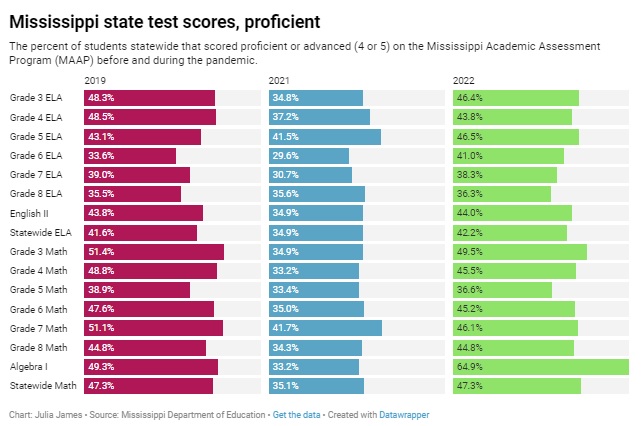Featured
Students Score Near Pre-Pandemic Levels on State Tests

By Julia James
Mississippi Today
Students in Mississippi approached pre-pandemic levels of achievement on state tests this spring, showing significant growth from the previous year.
The results from the 2022 administration of the state tests, or Mississippi Academic Assessment Program (MAAP), show that 2-4% fewer students passed English, science, and math exams this year than in 2019.
Last year in 2021, the first time that state tests were administered following the pandemic, around 10% fewer students passed their tests than in 2019, which education officials said was evidence of the impact of COVID-19 and were reflective of national trends.

These results, presented to the State Board of Education on Thursday, are a testament to the hard work of students and educators, as well as the return to in-person learning, according to Department of Education officials.
“They provide clear and indisputable evidence of the resilience of students and educators and their ability to recover from the disruptions to learning,” said Kim Benton, interim state superintendent of education. “We don’t always see that, but there’s a lot that has been going on to mitigate this disruption in learning and people have pulled out all the stops to make sure that’s happened.”
The number of students who scored proficient was exactly the same as or slightly above numbers from 2019, indicating that higher performing students possibly bounced back faster. Proficiency refers to the percentage of students who scored at a level 4 or 5 (proficient or advanced) on a 1 through 5 scale. A level 1 indicates a score of “minimal,” 2 is “basic” and 3 is “passing.”

Benton said these results show the need to look at the data of individual students and identify which areas they require support to advance.
“When I looked at the distribution, what it looked like to me was that we moved children up, we regained the proficiency levels pre-pandemic, but you also have children right there on the cusp (of passing)…which means we’ve got to push further faster,” she said.
Research from the Nation Bureau of Economic Research published in May of this year showed that, nationally, high-poverty schools were more likely to go remote and suffered larger declines in academic achievement when they did so.
Benton said the department is reviewing this new data to ensure that they are providing support appropriately, since literacy and math coaches are assigned to districts based on the number of students who did not reach proficiency.
A more detailed look at the state test results, including performance by subgroup and growth data, will be available in October when the state publishes districts’ accountability results.

This article first appeared on Mississippi Today and is republished here under a Creative Commons license.









































